Ted Landphair’s America has been up for a couple of months now, long enough for you who’ve checked it out to form an impression. As you see in the blurb next to my autumnal photo above, I’m hungry for your feedback.
So far there hasn’t been much. That could be a good sign of satisfied “customers.” Or it could reflect indifference. Nature abhors a vacuum, and I fret about indifference.
So please take a minute if you can, click on “Comments,” and answer a few questions. I’ll keep it to just five of them:
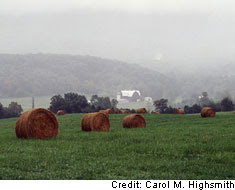 |
| Do Carol’s, and others’, photos enhance the reading experience of Ted Landphair’s America? |
2. Do you like my “Wild Words”? Are they useful, or do they just take up space?
3. Have you recommended Ted Landphair’s America to others, or would you?
4. What suggestions would you make to me, Carol, and my Web guru Anne Malinee to improve what you see?
5. How might I better involve you and other readers to make the blog more interactive? While I have a lot to say about America, this is not a monologue. You and your comments and stories and experiences matter to the success of Ted Landphair’s America.
***
Rescue Plan for Newspapers?
I have a couple of observations about my field, journalism, as it’s practiced in America. They are prompted by worrisome developments.
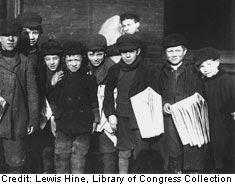 |
| In 1910, when this photo was snapped in Buffalo, New York, even kids could make a modest living selling newspapers. Buffalo was a three-daily town then. It’s down to the Buffalo News today |
Or I should say subscribing to them. Lots of people still read them at the office or check out their online editions. But true circulation numbers are dropping at even the nation’s most prestigious papers.
Publishers can see it plainly and painfully in their diminishing revenues. While money from subscribers and those who drop coins in news boxes is a small part of newspapers’ income stream, circulation numbers matter. That’s because the advertising rates that a newspaper can charge are based on the number of people who are buying the paper and are exposed to the ads. Newspapers with declining readership not only cannot raise rates, they also must sometimes cut them to keep advertisers from going away.
The local daily newspaper or papers – and many cities had two or three, published morning and afternoon – as well as a few big TV and radio stations once dominated the media spectrum. They hogged the city’s advertising dollars. But advertisers and readers now have a zillion and one options, including many online and on cable TV, that have pecked away at papers like the proverbial “death by a thousand cuts.” Even newspapers’ old, reliable money-makers like classified ads are shriveling in the face of online competitors such as eBay and Craigslist.
Growing desperate, publishers have tried all sorts of triage measures to hold onto readers and promotions to attract new ones, including:
- starting Web sites and blogs of their own to cross-promote their brand and their star journalists;
- making wholesale staff cuts, especially by offering contract buyouts to older workers to get them and their high salaries to go away;
- reducing national and especially international news to a few briefs buried inside the first section, and instead writing like mad about the local scene. The theory is that this is one coverage area in which the networks and cable newshounds can’t or won’t compete;
- closing bureaus or teaming with other papers, even longtime rivals, to keep the shell of a presence in Washington, New York, and fewer and fewer world capitals;
- adding pizzazz to their graphics, shortening stories and sentence length, showcasing glib writers in coverage of hip music and club scenes, as well as sponsoring endless reader contests and polls;
- merging with other newspapers and with big TV and radio operations. This helps corner the market on advertising dollars and presages still more slashes in staff. Invariably, it’s the employees of the purchasee, not the purchaser, who are soon looking for work.
No More Ink-Stained Wretches?
The near-to-last step – short of giving up and closing their doors – is to abandon paper papers – that is, tactile printed editions. No less eminent a paper than the century-old, daily Christian Science Monitor recently announced that in 2009 it will become an online product exclusively, though still offering a weekly print edition and – in a classic sign of our times – “daily e-mail editions,” whatever that means.
“The paperless newspaper now a reality,” screamed a Chicago Tribune headline, in reaction.
That paper knows something about the dire straits of the newspaper business. The Tribune Co. has taken over, downsized, and slashed bureau staffs of the venerable Los Angeles Times, the Sun newspapers of Baltimore, and other, smaller papers. “Journalism at its best,” the Tribune Co. Web site describes itself. Its staff, one of whom regularly lightens my wallet at poker, would choose less salutary words to describe what’s happening.
Good Old Days
“The original opening of the TV show ‘Lou Grant’ began with a bird in a tree,” wrote esteemed Chicago Tribune columnist Phil Rosenthal. Then “the tree was chopped down, the wood turned to paper, paper was delivered to a publishing plant. Newspapers came off the presses, were delivered, read, and then used to line a bird’s cage.”
That was 31 years ago: quainter times, as Rosenthal observed. Noting that the Christian Science Monitor had finally concluded that printing daily newspapers is simply too costly and that only online news seems to appeal to younger readers, Rosenthal stated the obvious – though eloquently:
“[The Monitor’s decision] is a test case to be watched intently by anyone who enjoys flipping pages, or at least need something for the bottom of their pet’s cage. . . . There’s an end-of-the-world-as-we-know-it vibe in the news business lately.”
Morning Paper and a Cup–a-Joe
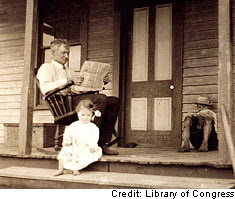 |
| This Tupelo, Mississippi, fellow enjoyed reading his newspaper. But a lot of Americans don’t hold the paper in their hands any longer, unless they’re picking up their computer monitors |
(We actually have three cats and thus no parakeet. But you get the idea.)
My children “live” on their cellphones and hand-held text devices. They watch some news on TV, and they check out news sites on the Internet when something is amiss in town or the nation or the world. A couple of them still get the newspaper, mostly for the sports or the political columns or the advertising inserts.
One of my daughters, though, doesn’t read the newspaper at all.
Read All About It! – But Quickly
Carol falls somewhere in between. When she’s not shooting photographs, she’s on the computer, perfecting them. While there, she checks online news sites habitually, and the TV picture flicks in the background. The sound goes on when something’s breaking.
But Carol, too, enjoys the morning paper. The difference between us is that when the juice and coffee are gone, so is she, while I move to the couch to meander through the front, Metro, Style, and even Business sections that she has only skimmed. She doesn’t crack the sports section. I devour it, metaphorically.
I don’t know if Phil Rosenthal is right that we’re seeing the end of the media world as we know it. But I’m sad about newspapers’ decline because I edited high school and college papers and worked for great local and national newspapers.
 |
| This woman is “reading the newspaper,” 21st-century-style |
***
We’ll Miss Your Toothy Smiles
The second, shorter, media observation is prompted by a New York Times report that “across the country, longtime local TV anchors are a dying breed.” Times reporter Brian Stelter cited several examples of veteran news hosts who’ve been booted out in cost-cutting measures. Local TV stations, it seems, have been wounded in the Internet onslaught as well.
 |
| This . . . |
This does not mean that the old, expensive, less-pretty faces were lions of journalism. Many were just more comfortable
 |
| . . . not this, is the smile that cost-cutting TV executives are looking for |
news readers. But comforting figures as well: old shoes that we liked and trusted, who got out in the community and usually cared for it, knew how to pronounce our towns and street, and knew who the mayor was two terms ago.
Like the old-timers kicked to the curb over at the paper, they have had their day. Youth has been served and will now do the serving.
But what will it serve, and with what depth and understanding?
***
Know Your Globe
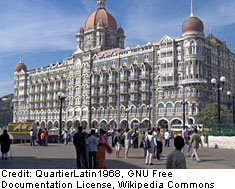 |
| Mumbai’s magnificent Taj Mahal hotel in better days. Who will soon forget the tragic sight of flames shooting from its rooftop, and gun-toting terrorists silhouetted in its grand windows? |
Well, I did not know this. In fact, I sheepishly admitted to myself, I had never heard of the place!
Never heard of a metropolitan area of 19 million people. Never knew that India’s thriving “Bollywood” film industry was centered there.
And somehow missed the word that Mumbai is the former Bombay.
Oh.
In calmer circumstances, my VOA Hindi Service colleagues would have explained, effusively, that Mumbai, the world’s largest city proper – let me say that again: the largest population within any city limits anywhere – had reverted to its Marathi-language derivation and away from its British colonial name – twelve years ago.
Twelve years ago! People still drink Bombay Gin. Bombay jackets remain in fashion. But, absorbed in my own country and life, I had completely missed the fact there hasn’t been a Bombay in India for more than a decade.
An American Prism
There are embarrassing lessons here: One is that American myopia and conceit are uninformed, foolish, and potentially dangerous. Another, especially for one who writes about America, is that we should not leap to assumptions about others’ degree of knowledge about our country – even among the educated. If I, that satisfied newspaper reader described earlier, did not know that Bombay had been ordered stricken from maps twelve years ago, can I assume that you know there are two American cities named Kansas City, or that New England is in the upper-east corner of our nation, or that Delaware and Idaho even exist?
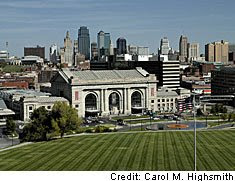 |
| Kansas City, Missouri’s, restored, 1914 landmark Union Station has now features shops and a vintage-train exhibit. And it is once again one of Amtrak’s busiest stops |
Have people in Paraguay or India heard of any Kansas City at all?
The next time that I sputter to Rob that of course everyone has heard of Kansas City or Phoenix or Buffalo, a single word will put me in my place:
“Mumbai.”
***
I Could-A Been Skiing!
For more than a week now, I’ve been working at home, not on job-related business but on a comprehensive database for a Web site that will showcase thousands of Carol’s photographs.
 |
| Here’s an early image of the dastardly spreadsheet, before the ordeal of entering SKUs and ASINs and such began. I had a bounce to my step then: energy, hope. Now I’m a shell of my former self |
On a computer spreadsheet, I crafted more than 10,000 lines of scintillating descriptions for Carol’s photos, which the Web considers to be products like garden tools or men’s socks. I carefully copied and pasted sinister little product SKU and ASIN codes, whatever they are, into columns among the 100,000 active cells on that sheet.
Don’t nod off. This gets worse.
Behind the scenes lurked still more code called HTML. My long-suffering Web wizard, Anne Malinee, explains that HTML, short for HyperText Markup Language, is a programming lexicon of symbols, formulas, and jargon that, it appears to the uninitiated, takes secret grips, passwords, and exceptional legerdemain, to interpret and untangle.
On my spreadsheet, which directs what finally shows up on the Web, every jot and tittle must be flawless. Ted Landphair, travelin’ man, had become Captain Computer, data-entry drone.
In one, just one, of my 100,000 cells, lurked a hidden imperfection: an extra space at the end of a number. Spaces, I’ll remind you, are invisible. Can you blame me for missing it late one early morning, if such a timeframe makes sense? Captain Computer has seen a lot of late early mornings.
Thanks to that single evil space, at heart-pounding moment of launch, all that appeared was a yawning white screen.
Perseverance Pays, But Ages You
I was ready to fly to Seattle, burst into Bill Gates’s office, and demand an explanation. But calmer heads prevailed and the errant space was detected – not by me, that’s for sure.
I think I’ll create a repository and call it the Errant Space Museum.
It was “publish time,” take two. Newspaper folks note: the Web people have even appropriated your term. They’re doing a lot more publishing than you are these days.
Victory was ours, champagne flowed, and Carol’s site, if not Captain Computer, is now live.
 |
| Ah, the beach in sunny Waikiki, Hawaii. When the spreadsheet ordeal has ended . . . maybe. Dream on: Carol has thousands more photos to put up |
While I get back to nouns and verbs and adjectives, I joyfully, with profound admiration and gratitude, turn the foreign languages of HTML and SKUs back to Anne.
TODAY'S WILD WORDS
(These are a few of the words from this posting that you may not know. Each time, I'll tell you a little about them and also place them into a cumulative archive of "Ted's Wild Words" in the right-hand column of the home page. Just click on it there, and if there's another word in today's blog that you'd like me to explain, just ask!)
Approbation. Warm congratulations and approval, especially from an official source such as your boss. Praise is nice. Approbation could mean a raise!
High Horse. One gets on his high horse to opine grandly on a topic, as if from a position of certitude. The word dates to the Middle Ages, when the tallest horses were used in battle. Apparently your lance would strike higher into your opponent’s mail. That’s not his stamped letters. Mail, or maille, was his armor.
Joe. No one’s certain, but calling your morning coffee, especially, a “cup of Joe” may go back to 1914, when a mean-spirited U.S. Navy admiral, Josephus Daniels, banned wine in officers’ quarters and stipulated that coffee would be the strongest libation allowed. Or maybe those wine-swilling officers had slurred the term “Cup of Java,” dating to the days when much coffee came from the Indonesian island.
Jot and tittle. Every minor detail. A jot is the little cross-mark on the lower-case “T,” and a tittle is the dot on a lower-case “I” or “J.” These are two words that never seem to be apart. Just as one never sees a nook without a cranny, one always attends to every jot and tittle. And jots always first for some reason. I wonder what would happen if we fixed our tittles and jots instead for a change?
Legerdemain. Skill and adroitness. The word is taken from the French léger de main and from the world of magic and illusion, where it refers to sleight, or lightness, of hand.
Pizzazz. An energetic personality. Flair. Pizzazz is an asset to television stars and infomercial hosts, but all that bubbliness can be annoying.
Please leave a comment.

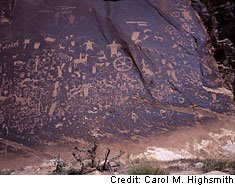














9 comments:
Alice 57 - from FRANCE near Paris
Hello Ted - I have just read that you were a little sad because you haven't received a lot of comments so far.... Poor Ted - I enjoy reading - listening with VOA - I also read "about you and about me"-
For foreign people, it is quite a long text - I have to "cut it" in two or three pieces - the vocabulary may be difficult - I have to check words in my dictionary because you use words that are not always used by foreign students - so I take the time to read your articles - maybe young readers find them a bit discouraging - it is my own opinion - for me it's a good exercise - I will go on reading them - so don't give up - "courage" as we say in France -
Alice
Louie, in excess of 75 from Denver,CO. I very much enjoy reading your take on America. So here goes:
Newspapers - The locals are so filled with biased political views so news gets lost between the local furniture ads.
Television - CNN or Constant Nagging at Nothing is on the tube at my local so that I must sit in a corner out of view. By the way, I do not own a TV.
Internet - I've been at a computer key-board, daily, since 1952.
Mobile Phones - Like mobile homes do not fare well in hurricane's. If only they were phones or is it phones only??
Blogs - The closest my old Webster comes to this word is "Bloke." So I guess you are a Blogs Bloke!
Seriously, saving the trees is not one of my more important goals but I do get most info from the WEB. I read few Blogs but yours is more of what I remember about HLM and the Evening Sun.
Wild Words is great and Carol's photos definitely enhance the reading experience. And, just because I do not write does not mean I don't read. Please keep it coming.
Louis
Hi,Ted,
This comment is from Beijing,China which had held a sucessful Olympic Games. It is the first time for me to read the blog. My English is too poor for my job. so I often listen to the VOA special English. Because i want to improve my written English and spoken English. I want to learn how to express my opinions. So i wish you will last the blog. I will be the honest reader.
Junbin Ma from Shanghai china.
Hi,dear Ted,i don't know what i want to say to u because of my chinglish,but i still say a little.when i was learning english from voa just moment i heard a report about ur blog which mainly introduces the landscape of ameirca.i think u r right,many people,especially those ones in china,whom wanna go to america to play or do bussiness and so on.them r lucklily,offering a high charge go to america.but most of people like me,it is only a dream.so i only get much more knowlege from books,website and other media.As u know,web blog is a popular media for much people to open their sight.Especially u told ur reader much knowledge about ur countries.i think i will be ur faithful reader.come on!if u need any help from me pls contact me by my msn:xirilianren2844@hotmail.com
Ted, Louisville, KY for me. Accidentally found you on VOA while surfing. I am a right-wing Christian Conservative. I am so 'right-wing' I think John Birch was a Communist! I am at a loss as to how so many "Americans" have lost their sense of 'America First'. That goes to show what 50 years of social re-engineering and re-education of our children has cost this once proud land.
I've not read enough to know where you stand; but I'll keep tuning in until you lose me. I like your lady's photos. I had a bit of a hard time on-site as it seemed some links were broken..but that might have been overload on my e-mail client. Bye for now, Greenwalnut
Hello Ted-san!
I have same opinion that Alice-san has written. For foreigners, your blog's archives are very long and include a lot of uncommon words. But, I try to conitinue reading this blog.
By the way, I also have a blog that tell about Japanse life in my poor English. If you have a time, please read it and post your comment on it.
I am a 46-years Japanese man.
Hi, Mr Ted Landphair,
I am brought here by a VOA mosiac on Dec. 5, 2008.
Nice to meet you here.
I am sure I will learn more from you about yourself and America.
I live in a small coastal valley town in California. I really like your site. Anyone who stands up for the greatness of this country will always have my vote. Since I am now 78 years old, I have been aware of the good works of VOA since I was 13 years old. I have also been an amateur photographer for over 60 years, so also appreciate you wife's work.
I feel your pain about attracting visitors. I have had my English Language Oddity blog on my website for 3 years and I am still struggling with exposure. The solution appears to be to find a niche. I think you have found one. I, for one, am going to put a link to your blog on my blog.
Incidentally, I heard about your blog from your web editor who happened to stumble upon mine. I owe her a bebt of gratitude.
Dear Ted,
I have been following your Ted Landphair's America on VOA since a long time ago, though it's only in recent months that I have been able to read the segment on VOA website as well. I would like to say how much I appreciate your fantastic pictures of words and camera lenz in recapturing the America of deep and dynamic splendors that truly touch the heart and soul of America ,which provides so much to savvy or fill up the imagination about the making of a nation.
I would look forward to more Ted Landphrair's America blogs.
Cui Litang
Shanghai, China
Post a Comment